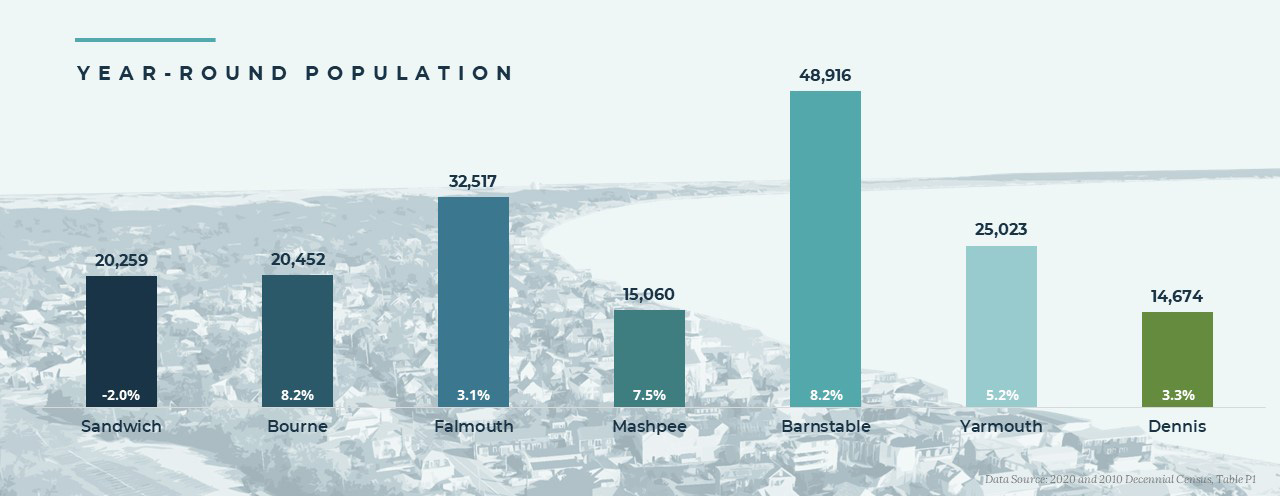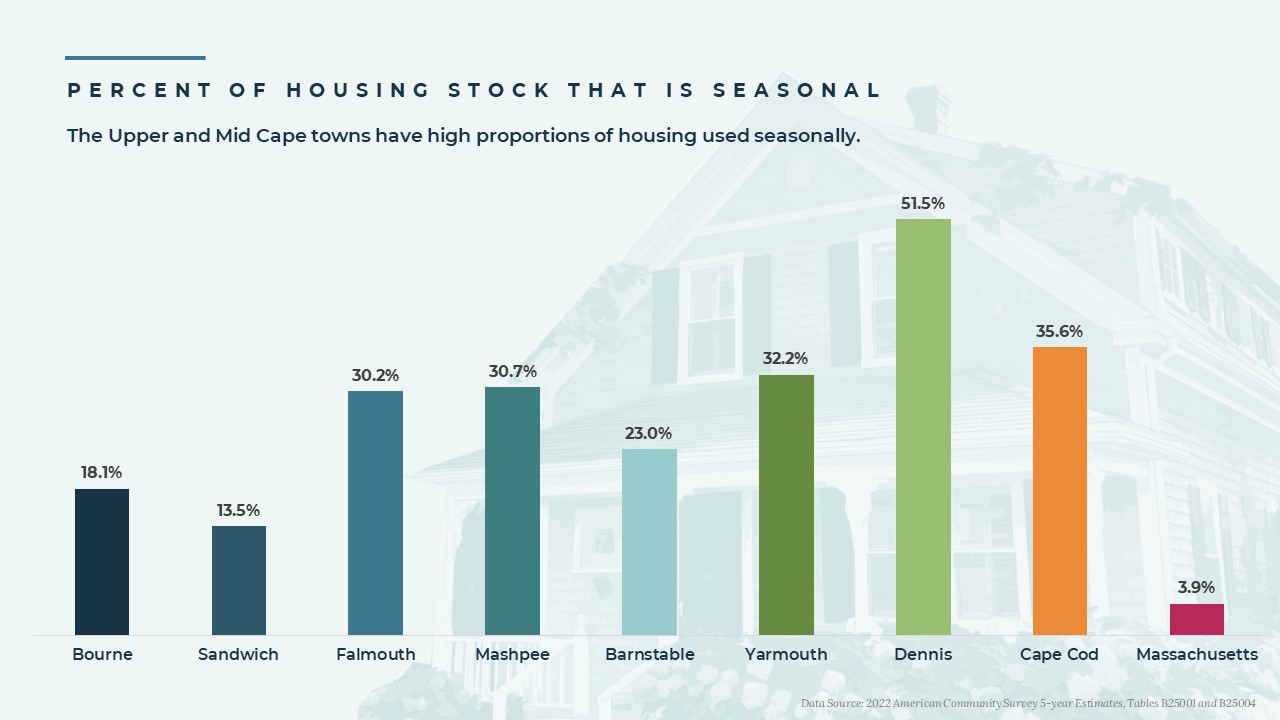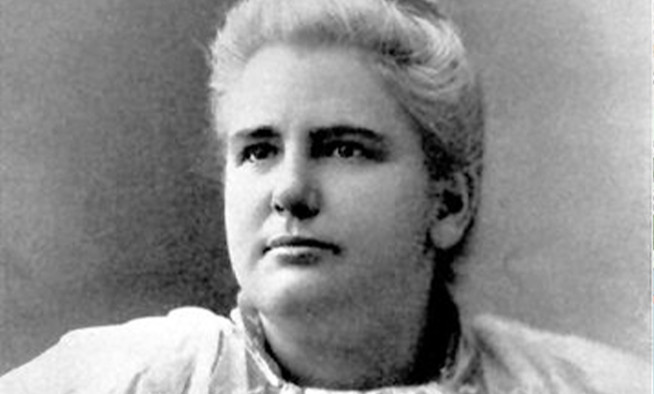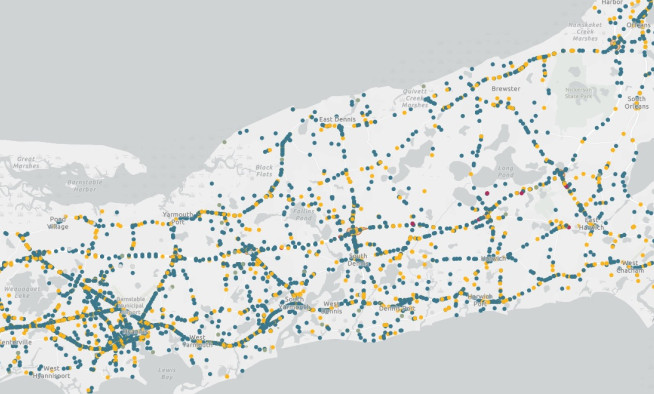Demographic & Economic Trends on the Mid and Upper Cape
Comprised of the towns of Barnstable, Yarmouth, Dennis, Bourne, Sandwich, Falmouth, and Mashpee, Cape Cod’s Mid and Upper Cape subregions are home to a robust year-round and workforce population, while also a desirable vacation, second home, and retirement destination. Like the region, the economy tends to be seasonal, the population is aging, and the gap between average household income and home prices is widening.
A growing, aging population
Nearly all of the Mid and Upper Cape towns experienced population growth between 2010 and 2020. The population of most towns grew by about 3 to 8 percent, with Sandwich losing 2 percent of its residents. Barnstable, which is the most populous town in the region with about 49,000 residents, experienced the highest rate of growth among these seven towns, though proportional growth was higher in some Lower and Outer Cape towns. Dennis’ year-round population of just 14,674 is the smallest in the Upper and Mid-Cape area.

The growing population is also aging: The Upper and Mid-Cape regions include more households with individuals aged 65 and older than the state, the percent of the population under the age of 18 declined from 2010 to 2020, and school enrollment declined by about 14 percent between the 2012-2013 and 2022-2023 school years. However, Mid and Upper Cape towns tend to be younger than the Lower and Outer Cape towns, and three Mid and Upper Cape towns have median ages lower than the County.
High housing costs, low median incomes
While Mid and Upper Cape towns have some of the lower home prices in the region, it remains very expensive to purchase a home in these towns and the income needed to affordably purchase a median priced single-family home far exceeds median household incomes.
The median household income in Mid and Upper Cape towns varies widely, with three towns lower than the county’s median household income and four towns higher. Again, the Town of Sandwich is an outlier – the average median income is $121,038 – higher than the $96,505 state median and the highest on Cape Cod. The Town of Yarmouth has the lowest median income among these towns and in the region, at $77,493.
Like the region as a whole, the cost of a single-family home has risen significantly in recent years. Mashpee has the highest median single-family home prices of the Mid and Upper Cape towns and the income needed to affordably purchase a median priced single-family home in the town in 2022 was nearly $240,000. In 2022, the median single-family home sales price in Mashpee was $750,000, a jump of more than $300,000 since 2018, when the median single-family home sold for $ $443,500. With a median sales price of $516,000, Yarmouth is the least costly, though still out of reach for a median income household.
Many homeowners and renters on the Upper and Mid Cape who have housing are housing cost burdened, spending 30% or more of their income on housing. A greater proportion of renters are estimated to be housing cost burdened in the Mid and Upper Cape towns than the region and the state. While the proportions of homeowners that are cost burdened are smaller than renters, there are still large portions (25%-34%) of cost-burdened homeowners.

Seasonality: Housing and Employment
All Upper and Mid Cape towns have a higher proportion of housing units used seasonally than the state; however, they are generally the less seasonal towns on Cape Cod. Sandwich is the least seasonal of all the Cape communities. Only one town has a higher proportion of seasonal housing units than the region—Dennis. All towns have a smaller proportion of year-round renter-occupied housing units than the state, and several are lower than the region.

Though less seasonal than the Lower and Outer Cape, seasonality still drives the economy. This can be seen by the fluctuations in unemployment rates in the Mid and Upper Cape towns, which vary more than the state, though less than many Lower and Outer Cape towns.

To further explore demographic and economic trends, please visit www.datacapecod.org
Related Posts




